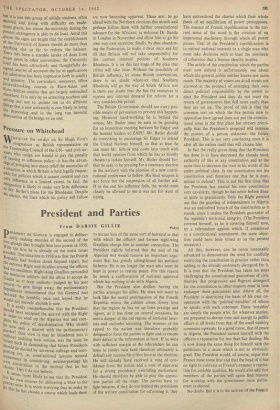P ressure on Whitehead HATEVER the verdict on Sir Hugh Foot's
W
resignation as British representative on the Trusteeship Council of the UN—and civil ser- vants who resign are bound to pay the penalty of ceasing to influence policy—it has the advan- tage of bringing into sharp relief the anomalies of a situation in which Britain is held legally respon- sible for policies which it cannot control and can only influence to a limited extent. In fact, the resignation- is likely to make very little difference to mt.. Butler's plans for the Rhodesias. Despite his silence, the lines which his policy will follow are now becoming apparent. These are: to go ahead with the Northern elections this month and perhaps follow them with further constitutional advance for the Africans; to welcome Dr. Banda to London in November and allow him to go his own way over secession; finally, by thus abandon- ing the Federation, to make it clear once and for all that Britain will not take responsibility for the current internal policies of Southern Rhodesia. It is on this last stage of the plan that critics will take issue. Without the possibility of British influence, let alone British intervention, there is no doubt whatever that Southern Rhodesia will go the way of South Africa; nor is there any doubt that she has the resources to repress any internal demand for reform for a very considerable period.
The British Government should use every pos- sible means of persuasion to prevent this happen- ing. However hard-working he is behind the scenes, Mr. Butler must be seen to be pressing for an immediate meeting between Sir Edgar and the banned leaders of ZAPU. Mr. Butler should do everything to encourage Sir Edgar to attend the United Nations himself, so that at least he can meet Mr. Sithole and come into touch with that world opinion from which he has so blindly chosen to isolate himself. Mr. Butler should fur- ther be seen to be pressing for a summary election in the territory with the promise of a new consti- tutional conference to follow. His final weapon is not force but the suspension of all further aid. If in the end his influence fails, the world must clearly be allowed to see it was not for want of trying.














































 Previous page
Previous page